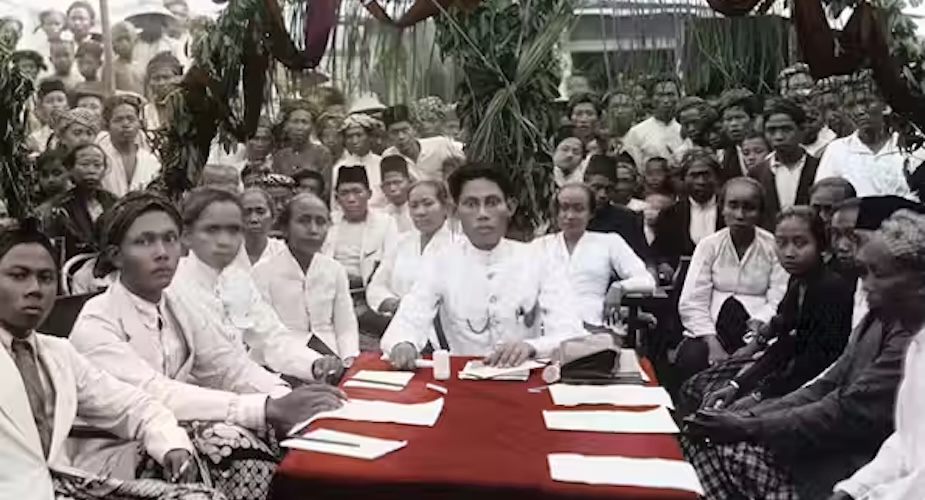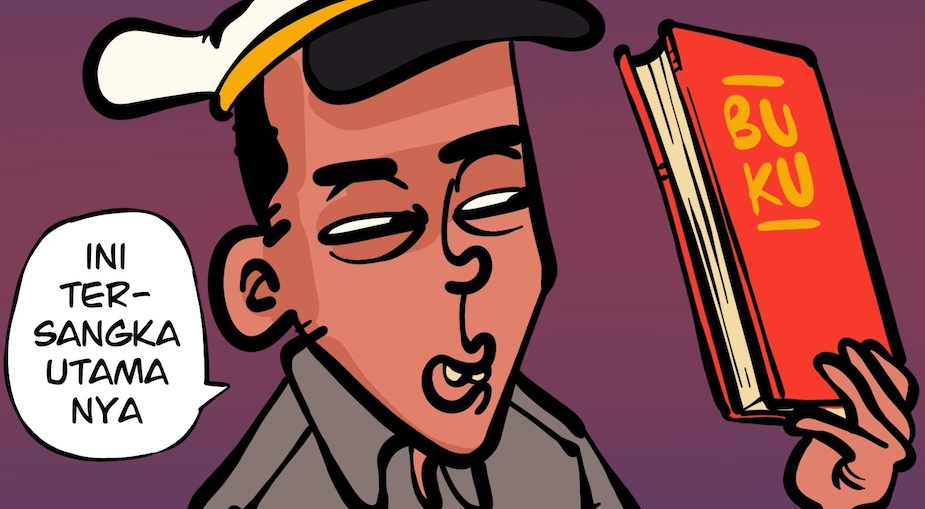In August 1975 a brief but bitter civil war in East Timor pitted Fretilin against the UDT. It was the prelude to Indonesian annexation. Since then, rivalry has hampered East Timorese cooperation, and been exploited by Indonesian government spokespersons. In this generous statement the UDT speaks openly about the past, and embraces Nobel Peace Prize winner Jose Ramos- Horta.
The Supreme Political council of the Timorese Democratic Union (UDT) welcomes the announcement by the Nobel Peace Committee that the 1966 winners of the Nobel Peace Prize are two East Timorese, Bishop Carlos Ximenes Belo and Mr Jose Ramos-Horta. We extend to our two compatriots our most heartfelt congratulations. Within minutes of the announcement of the award, UDT leaders and militants sent numerous messages to the two winners. Now, the UDT leadership wishes to issue a more detailed account of UDT views about the role of Mr Ramos-Horta in more than two decades of dedicated and tireless efforts towards our common cause.
The Indonesian government and media have engaged in a grotesque slander campaign against Mr Jose Ramos-Horta, as they did against Bishop Carlos Ximenes Belo in the fall of 1995, on the eve of the Nobel Peace Committee's announcement of the 1995 winners. Most international observers were predicting in 1995 that Bishop Belo was going to be the winner that year. There were even orchestrated street demonstrations in Indonesia and petitions denouncing Bishop Belo. Now it is Mr Ramos-Horta who is being denounced and called all sorts of names.
AdversaryMr Ramos-Horta is a political adversary of the UDT, but in more than 21 years he always displayed flexibility, tolerance and readiness to cooperate with his adversaries. It was through Mr Ramos-Horta's tireless efforts that in January 1975 the UDT and Fretilin signed a coalition.
When violence erupted in East Timor in August 1975, Mr Ramos- Horta was out of the country. But he sent personal messages to the UDT leaders as he did to his Fretilin colleagues urging us to stop the fighting. Mr Ramos-Horta also offered to mediate between the two parties.
When he was able to return to East Timor in mid-September 1975, when the conflict ended with Fretilin gaining military supremacy over the UDT, he visited all prisoners, cooperated with the International Red Cross, and raised his voice when prisoners were mistreated by their captors. He secured the release of many UDT prisoners and managed to organise the evacuation of some stranded children to Australia to reunite with their families.
Within hours of his arrival in Dili, he secured the release of Portuguese army soldiers who had been detained by Fretilin. They were handed over to the ICRC who repatriated them to Portugal in September 1975.
ToleranceThere is not one single East Timorese who can claim that Mr Ramos-Horta was engaged in violence, directly or indirectly. Quite the contrary, he was among the very vocal few who tried to control the excesses and always displayed enormous tolerance and humanity. He visited the prisoners and had tears in his eyes when he heard of their mistreatment, and did not hesitate to express his revulsion at meetings of the Fretilin Central Committee. This caused him numerous serious problems with the extremists, and more than once he was threatened with arrest and expulsion from Fretilin.
When Fretilin gained the upper hand in September-November 1975 he visited UDT imprisoned leaders and discussed with them ideas about how they could reorganise themselves. Some UDT leaders who crossed over to West Timor at the end of August 1975 were immediately held hostage in Indonesia and were coerced to support Jakarta policies.
Social democratIn an extraordinary display of political wisdom, Mr Ramos-Horta met with those UDT leaders who stayed behind in East Timor and were detained by Fretilin, and proposed that they reorganise the party in East Timor. Our colleagues agreed with his wise proposal but the Fretilin hardliners blocked it.
Mr Ramos-Horta was a social democrat from the very beginning and never changed his stand ever since. He was never part of the Marxist faction of Fretilin and was always viewed with suspicion by the extremists.
In 1978 he argued for reconciliation between UDT and Fretilin. He was attacked by the then Fretilin leader abroad, Mr Abilio Araujo, a Marxist-Leninist ideologue, and was labelled a 'traitor'. Mr Abilio Araujo is now a wealthy businessman in Lisbon, but only a few years ago he was a dogmatic communist who branded any one like Ramos-Horta a 'traitor' and a 'capitalist roader'. Mr Ramos-Horta was even physically threatened with death by the extremists.Alliance
When he visited Australia in June-July 1984, he discussed with us again the idea of an alliance between Fretilin and UDT, and in 1986 the two parties signed the Nationalist Convergence.
For more than 21 years he has argued for dialogue with Indonesia. For this he was also accused as a sell-out by the same extremists who are today in Jakarta's payroll.
Even though we in UDT at times had our differences with him, he never hesitated to help us. On several occasions, he helped UDT or individual members of UDT out of his own pocket. In critical periods of our struggle requiring immediate diplomatic activities, he supported some of the travels, accommodation and in many occasions organised for us to stay with his friends. His sense of humour always helped us in our hours of despair. His determination and passion, professionalism in carrying out his duties, but also his love for life, has always inspired us. We often joke that he is a non-card carrying UDT member rather than a leader of Fretilin.
In the face of the slanderous attacks on Mr Ramos-Horta, the UDT feels it is its obligation to put the record straight, because not doing so would be morally unfair. The UDT is proud that two East Timorese won the 1996 Nobel Peace Prize Award, and look forward to continue a 21 year old association with our political adversary Mr Ramos-Horta in our common goal of pursuing freedom for our country, through a just and peaceful solution.
Signed: Joao Carrascalao, President of UDT; Domingos de Oliveira, General Secretary; Sydney, 24 October 1996. The Timorese Democratic Union (UDT) Supreme Political Council can be contacted at PO Box 3233, Liverpool NSW 2170, Australia.











